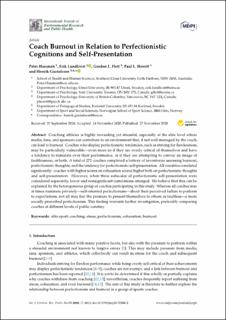Coach burnout in relation to perfectionistic cognitions and self-presentation
| dc.contributor.author | Hassmén, Peter | |
| dc.contributor.author | Lundkvist, Erik | |
| dc.contributor.author | Flett, Gordon L. | |
| dc.contributor.author | Hewitt, Paul L. | |
| dc.contributor.author | Gustafsson, Henrik | |
| dc.date.accessioned | 2021-06-04T09:23:19Z | |
| dc.date.available | 2021-06-04T09:23:19Z | |
| dc.date.created | 2020-12-07T18:55:27Z | |
| dc.date.issued | 2020 | |
| dc.identifier.citation | International Journal of Environmental Research and Public Health. 2020, 17(23), Artikkel 8812. | en_US |
| dc.identifier.issn | 1661-7827 | |
| dc.identifier.uri | https://hdl.handle.net/11250/2757659 | |
| dc.description | This article is an open access article distributed under the terms and conditions of the Creative Commons Attribution (CC BY) license (http://creativecommons.org/licenses/by/4.0/). | en_US |
| dc.description.abstract | Coaching athletes is highly rewarding yet stressful, especially at the elite level where media, fans, and sponsors can contribute to an environment that, if not well-managed by the coach, can lead to burnout. Coaches who display perfectionistic tendencies, such as striving for flawlessness, may be particularly vulnerable—even more so if they are overly critical of themselves and have a tendency to ruminate over their performance, or if they are attempting to convey an image of faultlessness, or both. A total of 272 coaches completed a battery of inventories assessing burnout, perfectionistic thoughts, and the tendency for perfectionistic self-presentation. All variables correlated significantly: coaches with higher scores on exhaustion scored higher both on perfectionistic thoughts and self-presentation. However, when three subscales of perfectionistic self-presentation were considered separately, lower and nonsignificant correlations emerged. We believe that this can be explained by the heterogeneous group of coaches participating in this study. Whereas all coaches may at times ruminate privately—self-oriented perfectionism—about their perceived failure to perform to expectations, not all may feel the pressure to present themselves to others as faultless—a more socially prescribed perfectionism. This finding warrants further investigation, preferably comparing coaches at different levels of public scrutiny. | en_US |
| dc.language.iso | eng | en_US |
| dc.subject | burnout | en_US |
| dc.subject | coaching | en_US |
| dc.subject | elite sport | en_US |
| dc.subject | exhaustion | en_US |
| dc.subject | perfectionism | en_US |
| dc.subject | stress | en_US |
| dc.title | Coach burnout in relation to perfectionistic cognitions and self-presentation | en_US |
| dc.type | Peer reviewed | en_US |
| dc.type | Journal article | en_US |
| dc.description.version | publishedVersion | en_US |
| dc.rights.holder | © 2020 by the authors | en_US |
| dc.source.pagenumber | 9 | en_US |
| dc.source.volume | 17 | en_US |
| dc.source.journal | International Journal of Environmental Research and Public Health | en_US |
| dc.source.issue | 23 | en_US |
| dc.identifier.doi | 10.3390/ijerph17238812 | |
| dc.identifier.cristin | 1857184 | |
| dc.description.localcode | Institutt for idrett og samfunnsvitenskap / Department of Sport and Social Sciences | en_US |
| dc.source.articlenumber | 8812 | en_US |
| cristin.ispublished | true | |
| cristin.fulltext | original | |
| cristin.qualitycode | 1 |
Tilhørende fil(er)
Denne innførselen finnes i følgende samling(er)
-
Artikler / Articles [2119]
-
Publikasjoner fra Cristin [1107]
